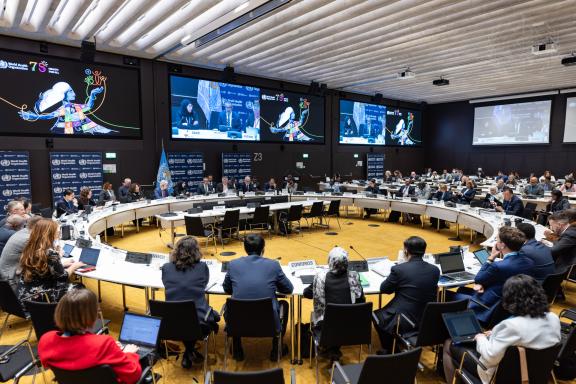FDI stresses the importance of optimal oral health for all at the 154th WHO Executive Board
FDI highlights the opportunities to accelerate Universal Health Coverage and sustainable development through sustained action on oral health.

The 154th Session of the World Health Organization's (WHO) Executive Board (EB154) took place from 22 – 27 January 2024, at the WHO Headquarters in Geneva, Switzerland. WHO Member States were joined by other United Nations Agencies and non-State Actors including FDI and the International Association for Dental, Oral and Craniofacial Research (IADR) to discuss an agenda consisting of 45 items and subitems while the relevant WHO Secretariat Team provided technical and logistical support. EB 154 approved over 20 Resolutions and Decisions.
FDI and IADR call on WHO Member States to accelerate Universal Health Coverage through sustained action on oral health
WHO Member States also reviewed a report on the progress towards UHC. The WHO Director General’s report builds on the United Nations General Assembly’s High-level Meeting on Universal Health Coverage (UHC) held on 21 September 2023, and the subsequent adoption of a new political declaration on UHC: “expanding our ambition for health and well-being in a post-COVID world”. The report reminds governments that progress towards UHC is stagnated and cannot be achieved without investment in primary health care. It also notes that the 2030 UHC and related sustainable development goals will not be achieved without drastic and sustained actions to turn the tide.
FDI and IADR delivered a joint statement which reminds governments about the opportunity to accelerate UHC by including oral health services in essential UHC benefit packages.
WHO Global Oral Health Action Plan (2023-2030) baseline report highlights urgent areas for action.
EB154 reviewed the WHO Director-General’s annual update on progress achieved in the prevention and control of noncommunicable diseases (NCDs). His report includes the first set of cost-effective oral health interventions specific to oral health and the baseline report of the recently approved Global Oral Health Action Plan (2023 – 2030). This baseline report forms the foundation upon which progress will be reported every three years until 2030.
The Action Plan`s baseline report highlights urgent gaps to address in the global response to oral diseases. It notes that 23% of the global population is entitled to essential oral healthcare services, 31% of 194 countries have an operational national oral health policy backed with dedicated staff and only 20% of countries have national guidance on optimal fluoride delivery.
The Director General’s report also cautions that countries are off track to achieve other agreed NCD targets by 2025 and 2030 and presents the fourth UN High-Level Meeting on NCDs in 2025 as an opportunity to address evolving focus areas of the NCD agenda.
In a joint statement, FDI and IADR called on governments to implement all agreed actions to address oral health and ensure adequate capacity for surveillance going forward.
It is also noteworthy that several WHO Member States including Ireland, the European Union countries and Malaysia reaffirmed their commitment to oral health.
Oral health and the social determinants of health equity
The WHO Director General’s report on the social determinants of health equity provides an update on the process to develop the WHO World Report on the Social Determinants of Health Equity (SDoHE). The report includes 14 proposed recommendations to address the key structural determinants to improve health equity.
FDI and IADR’s joint statement on this agenda item builds on two of these 14 recommendations:
- recommendations to address economic inequality and invest in universal public services for health equity and well-being and
- recommendations to build a health and care sector that ensures equitable access based on genuine participation.
It emphasizes that out-of-pocket costs are major barriers to accessing oral healthcare and calls on governments to ensure equitable access to a continuum of quality oral health services across the life course.
FDI promotes the importance of exclusive breastfeeding and healthy nutrition for oral health
EB154 also received an update on progress to achieve the 2025 maternal, infant and young child nutrition targets. The report highlights an increase in the number of infants exclusively breastfed, with the possibility of surpassing the 2025 global target of 50%. However, it also cautions that progress in addressing childhood overweight across regions remains uneven. It also notes that operational policy measures to increase the consumption of healthier foods are still scarce.
In a joint statement, FDI and IADR reminded WHO Member States that breastfeeding lowers the risk of early childhood caries and NCDs in infants and children. They also urged them to implement a comprehensive set of policies to promote healthy diets, as emphasized in FDI’s Position on Free Sugars.
FDI also provided input into other relevant agenda items and led or supported statements on Wellbeing and health promotion and WHO`s work in Health Emergencies.
